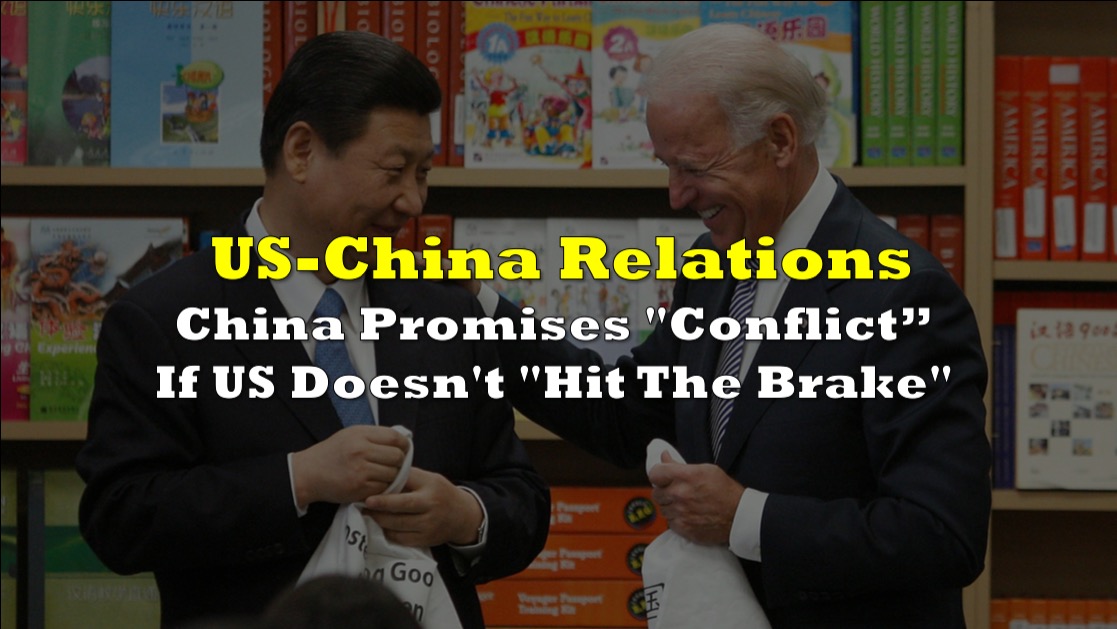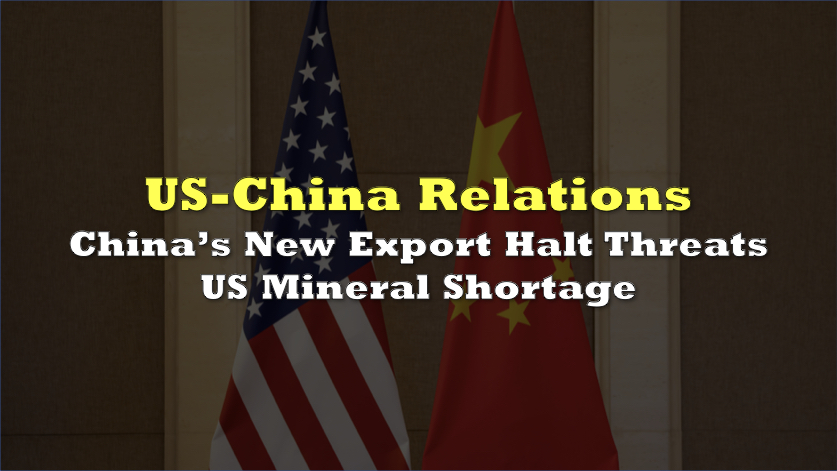China’s new foreign minister, Qin Gang, said relations with the United States had deviated from a “rational path” and warned of conflict if the United States did not “hit the brake.”
Qin, who was China’s ambassador to the United States until recently, stated that China would “pursue a sound and stable relationship with the US.” But the Biden administration’s call for “establishing guardrails and not seeking conflict simply means that China should not respond in word or in action when attacked.”
“That’s not possible,” Qin said. “If the US does not hit the brake but continue to speed down the wrong path, no amount of guardrails can prevent derailing and there will surely be conflict and confrontation.”
Qin’s comments were included in an address that marked his first press conference as foreign minister on Tuesday, as Beijing sets up its unprecedented third Xi Jinping-led government.
Tariffs and penalties have exacerbated tensions between the United States and China in recent years. Taxes were imposed by the Trump administration in response to long-standing concerns from international corporations over uneven access to China’s market.
Recently, the Biden administration stated that the United States is in rivalry with China and barred American companies from collaborating with Chinese partners on high-end chips.
Taiwan
But Taiwan is an issue that Beijing warns the US shouldn’t cross, with Qin saying that the self-governed island is an internal affair of China.
The threat, while foreboding, is not new. After then-US House Speaker Nancy Pelosi’s visit to Taiwan, Chinese embassy spokesman Liu Pengyu at the time asserted the mainland’s sovereignty over the island as it called out the United States for its proposed $1.1 billion arms sale to Taiwan.
“China will resolutely take legitimate and necessary counter-measures in light of the development of the situation,” Liu said.
Yang Jiechi, a Beijing top diplomat, said in May that “if the US side insists on playing the Taiwan card and goes further and further down the wrong road, it will certainly lead to a dangerous situation.”
Xi himself warned US President Joe Biden against “playing with fire” over Taiwan during a phone call between the two leaders, then at the time when Pelosi’s visit was just being planned.
“Those who play with fire will only get burned,” Chinese state media quoted Xi as telling Biden. “[We] hope the US side can see this clearly.”
In June, then-Chinese Foreign Minister Wang Yi warned that following Pelosi’s visit and a series of military exercises around Taiwan, these actions would create “a bigger crisis” over the self-governed island.
“The usual tactic of the US is that they first create the problems, and then use them to achieve their goal. But this approach will not work on China,” Wang said.
“We must solemnly warn the US not to act rashly or create a bigger crisis,” he also said in Cambodia on the sidelines of a foreign ministers’ meeting of the Association of Southeast Asian Nations.
The tension seems to have cooled when Biden and Xi met for the first time as respective presidents of their countries in Bali ahead of the G20 summit back in November. The meeting of the two leaders–a result of months of planning and hours of negotiation–reportedly ended on an optimistic note towards strengthening bilateral relations while acknowledging fundamental disagreements that could jeopardize these efforts.
Both of the leaders have signaled openness to repairing their countries strained relations.
But following the meeting, Wang also warned US Secretary of State Antony Blinken in a telephone call that the US must stop its “old routine of unilateral bullying” and the act of trying to challenge China’s red lines using “salami slicing” tactics. The Chinese official was referring to the practice of performing a series of minor activities in order to create a much larger effect that would be difficult to attain with a single massive action.
Xi also sent a veiled warning to the US over its relations with Taiwan in his address to the Chinese people earlier this year. The Chinese president vowed to “resolutely carry out major struggles against separatism and interference” and “firmly grasp the initiative in cross-strait relations.”
In terms of national defense, Xi stated that China has taken “solid steps” in the last year to upgrade the defense and armed forces. According to a separate article in the Communist Party’s flagship publication, the People’s Daily, he reportedly instructed the military in charge of border defense to increase their alertness and be ready for combat during the Lunar New Year.
Xi, elected for the third time as China’s president, is rumored to be working on forcefully reuniting Taiwan to the mainland during what could be his final term as the country’s leader.
Blinken said back in October that China had made a “fundamental decision that the status quo was no longer acceptable, and that Beijing was determined to pursue reunification on a much faster timeline.”
“If peaceful means didn’t work, then it would employ coercive means,” Blinken said. “And possibly, if coercive means don’t work, then maybe forceful means to achieve its objectives. And that is what is profoundly disrupting the status quo and creating tremendous tensions.”
Balloongate
The recent incident on an alleged Chinese spy balloon floating over American airspace and the consequent actions taken in dealing with the situation did not help with strained US-China relations. Qin reiterated China’s view that the unmanned dirigible was subject to forces beyond Beijing’s control.
“The US acted with the presumption of guilt,” he said. “The result is the US and China policy has entirely deviated from the rational and sound track.”
The balloon incident intensified on Feb. 4 when the US Navy shot down the device, also prompting Blinken to abandon a trip to Beijing intended to defuse tensions. The dirigible was tracked floating over the continental US for days before it appeared over Montana.
Biden reportedly ordered the US military to shoot it down as soon as it was safe and it did not pose any danger to people or property on the ground. Since then, the US military has shot down three other flying objects over North America.
China’s Defense Ministry spokesperson, Tan Kefei, expressed “solemn protest” against the US’s actions in shooting down the balloons and stated that China reserves the right to deal with similar situations in the future. The Foreign Ministry also accused the US of “overreacting” and “seriously violating international practice.”
“The Chinese side has repeatedly informed the US side after verification that the airship is for civilian use and entered the US due to force majeure – it was completely an accident,” the Chinese Foreign Ministry said in a statement.
Beijing then countered that it is actually US high-altitude balloons which had violated Chinese airspace more than ten times since the beginning of 2022, prompting a strong denial from Washington.
Chinese foreign ministry spokesperson Wang Wenbin added that “it is nothing rare for US balloons to illegally enter other country’s airspace” and that the West should “reflect upon itself and change its wrong practice.”
China-Russia relations
Another point of growing contention between the two countries is the apparent cozying relationship Beijing has with Russia, which launched an invasion on Ukraine more than a year ago. China has declined to term the attack an invasion, instead pushing for peace talks.
Qin, however, touted Beijing’s relations with Moscow as a model for relations with other countries.
He stated that “major countries” must assess whether they are pursuing “exclusive political blocs” or “fostering friendship.” Qin stated that China-Russia relations pose no threat to any country and are not subject to third-party intervention.
“The more unstable the world becomes the more imperative it is for China and Russia to steadily advance relations,” Qin said.
During the start of the Russia-Ukraine war, China opposed the sanctions introduced by the West and the EU against Russia, suggesting that they will not solve the inherent problems caused by the Ukraine-Russia conflict, but rather create new ones.
As Beijing continues to refuse calling Russia’s act an invasion and calling the Asian neighbor out, this prompted concern among White House officials, who have threatened serious repercussions should the communist country provide aid to Moscow. The Chinese Foreign Ministry at the time warned it would retaliate in the event the US decided to punish Beijing over its ties with Russia.
The seemingly friendly relations between China and Russia has made the former a subject of the economic sanctions the West and EU have been dishing out to forces and personalities that appear to be aiding Moscow in the war. NATO has expressed concern that China may be considering supplying weapons to Russia, which would escalate the war into a larger confrontation — one with Russia and China joining forces on one side, and Ukraine with NATO on the other.
According to German news site Der Spiegel, Beijing and Moscow are negotiating the purchase of 100 strike drones, which might be delivered as soon as April.
“We are very concerned that China is considering providing lethal support to Russia in its aggression against Ukraine,” Blinken told NBC in an interview. “And I made clear that that would have serious consequences in our relationship as well.”
Recently, Beijing released its position on the “political settlement of the Ukraine crisis” as its ongoing war with Russia hit its one-year anniversary. The list of policies that China calls for both warring countries to follow range from respecting sovereignty to securing food and industrial supply chains. In the interest of taking a neutral stance, Beijing’s position appears vague and filled with platitudes.
“All countries, big or small, strong or weak, rich or poor, are equal members of the international community,” the statement read.
Blinken reacted to the policies, saying “China can’t have it both ways when it comes to… the Russian aggression in Ukraine.”
“It can’t be putting forward peace proposals on the one hand, while actually feeding the flames of the fire that Russia has started with the other hand,” Blinken added.
Information for this briefing was found via Bloomberg, CNBC, CNN, AlJazeera, Anadolu Agency, Sky News, and the sources mentioned. The author has no securities or affiliations related to this organization. Not a recommendation to buy or sell. Always do additional research and consult a professional before purchasing a security. The author holds no licenses.









